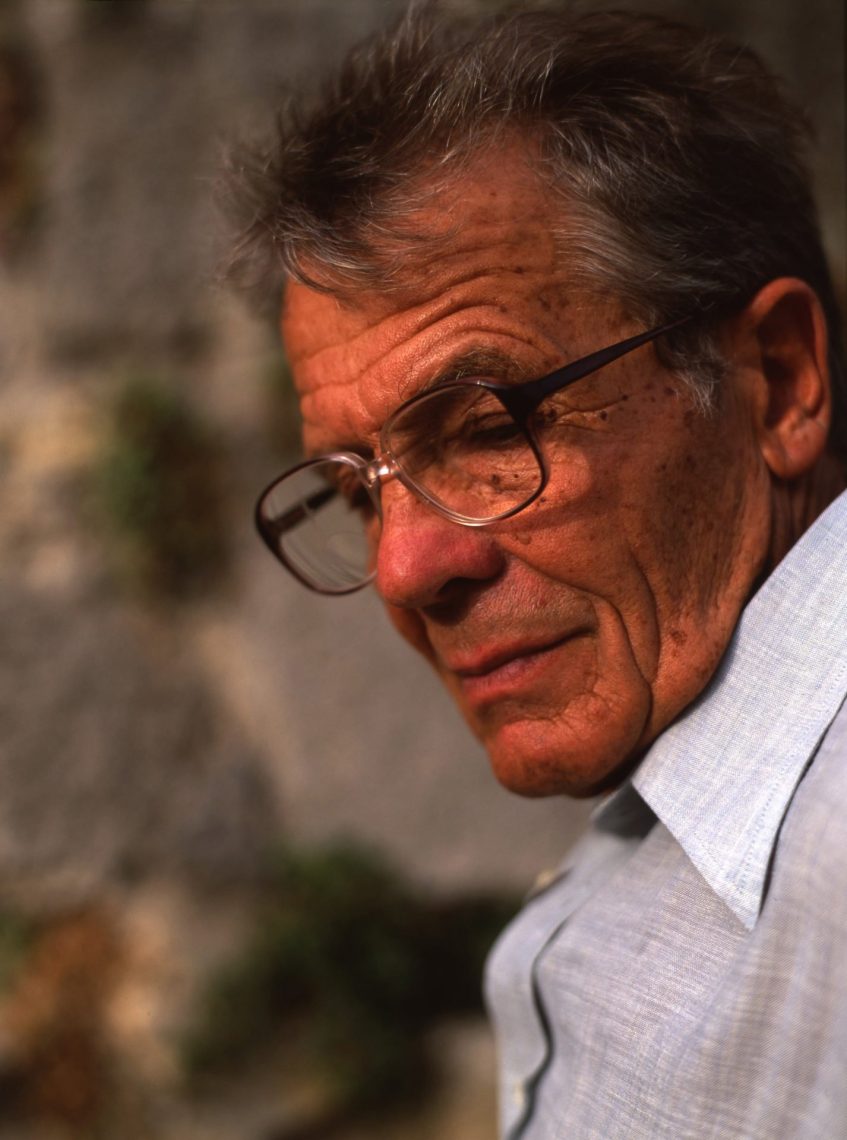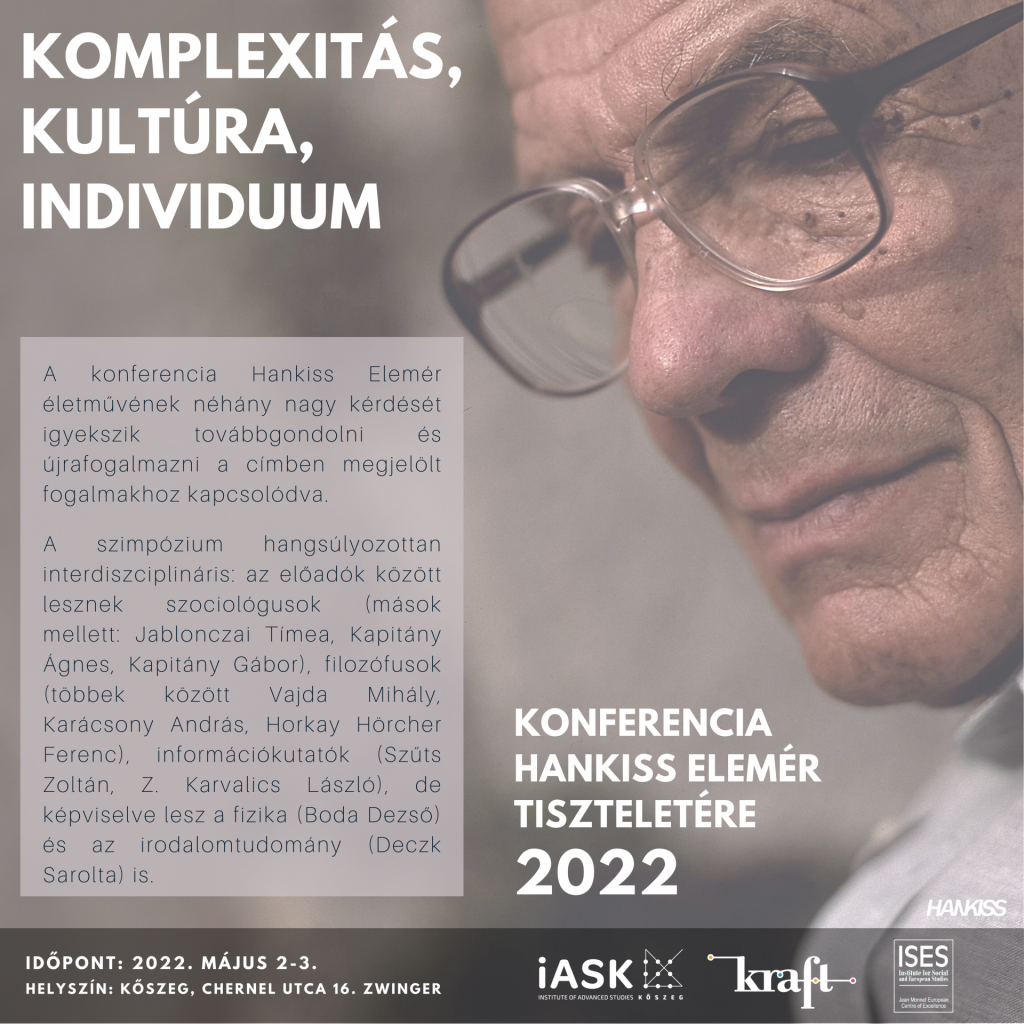Research & Studies


On 02-03 May 2022, the Hankiss Research Group of the Institute of Advanced Studies Kőszeg (György Csepeli, Csaba Olay and István Sümegi) will organise a conference in Kőszeg.
The conference aims to reflect on and reformulate some of the major questions of Elemér Hankiss’ life’s work in relation to the concepts indicated in the title.
The symposium will be interdisciplinary: the speakers will include sociologists (among others Tímea Jablonczai, Ágnes Kapitány, Gábor Kapitány), philosophers (Mihály Vajda, András Karácsony, Ferenc Horkay Hörcher), information researchers (Zoltán Szűts, László Z. Karvalics), but physics (Dezső Boda) and literary studies (Sarolta Deczk) will also be represented.
The presentations on the first day will take a more general, theoretical approach to the concepts in the title, while most of the participants on the second day will explore the issues raised in more depth along the lines of a specific question.
The preliminary program will be available HERE!
Summary of the Conference
The organizers of the conference, István Sümegi, head of the Hankiss Archive, György Csepeli and Csaba Olay, iASK scholarship researchers, emphasized the timeliness of Elemér Hankiss’ intellectual legacy, and drew attention to the fact that the writing on the wall has appeared, humanity has entered an era of complexity and opacity. The boundary between society and nature had disappeared, and the laws of complex systems were revealed to apply to both. Changes are unpredictable and unexpected. In the networked communication space of social media, information epidemics are breaking out, increasing uncertainty. The human mind has not evolved to deal with complexity. It seeks certainty in uncertainty as an escape from complexity. Both narrow and broad concepts of culture have become unstable, and its capacity to fulfill and integrate is called into question. The consequences of failures of cognitive adaptation are depression, anxiety, paranoia, irrational credulity and disbelief.
The two-day conference was attended by researchers from the IASC in Hungary and abroad. The language of the conference was Hungarian, the presentations and the discussions that followed them were translated into English for the foreign participants.
Following the call for papers, 18 speakers came to Kőszeg with 16 presentations to the conference, which was opened on 2 May 2022. In his opening speech, Ferenc Miszlivetz, Director General of the Institute, expressed his pleasure that after the epidemic, for the first time an offline conference was held within the walls of the Institute, but that it was also possible to follow the conference remotely via the Internet. The Director-General briefly presented the two main areas of activity of the FTI. The first is the field of basic research in chemistry, which at the FTI-IASC is characterized by its interdisciplinary nature. The second is an active urban development in small towns, the KRAFT program, in which the member cities of the ever-expanding Association of Pannonian Cities participate. Ferenc Miszlivetz stressed that the basic idea of the conference, complexity, was the organizing paradigm of Elemér Hankiss’ work, which is increasingly relevant in today’s crisis reality. Gergely Tóth, Deputy Director-General, then spoke about the complexity of soil research, which can be taken into account not only in the narrow study of soil variables but also in the study of natural and social variables that disturb the balance of the Earth. András Nagy, reflecting on the relationship between art and science, highlighted Elemér Hankiss’ exceptional sensitivity to complexity in the fields of literature, society and philosophy, which led him, at the end of his life, to the study of the relationship between quantum mechanics and society. Gábor Hofer-Szabó, from the Parmenides Foundation in Munich, presented the work of the Sociophysics Workshop, which he runs, bringing together philosophers, sociologists and physicists to read and discuss articles on the relationship between physics and social reality. István Sümegi welcomed the conference on behalf of the organizers, briefly introducing the Hankiss Archive, which is responsible for the care and preservation of the intellectual and literary legacies of István Nemeskürty, Gyula Hernádi and István Borsody. The result of the work of the Archivum is the Talking Houses series, which has published two volumes on prominent citizens of houses in Keszthely and is currently in press, and a third volume on the inhabitants of Keszthely.
On the first day of the conference, three sessions were held. The first session included four presentations. The first presentation was given by László Ropolyi, who identified complexity as a segment of reality reserved for science, the challenge of which is to keep asking new questions. Dezső Boda illustrated the hierarchical representation of complexity through physical, biological and social systems, based on his recently published book in iASK. András Karácsony presented the simplifying mechanisms of everyday consciousness that exclude complexity, recalling the ideas of Alfred Schütz. The presentation by Gábor Kapitány and Ágnes Kapitány was delivered by Gábor Kapitány. The speaker approached culture from the perspective of the possibilities and dangers of individualism.
The second session opened with a presentation by Miklós Lehman, who showed how cognitive and behavioral strategies work in the complex virtual world of digitalization and datafication, based on well-chosen case studies. Ádám Lovász shed light on August von Hayek’s economic theory, which is once again seen as important today, by placing it in the context of complexity. Veronika Kövesdi presented the process of simplification of complex religious phenomena in the wake of market and media constraints of consumer society. Timea Jablonczai raised questions of individual and collective responsibility through the examples of intergenerational memory patterns of traumatized communities.
The opening presentation of the third session was given by Ferenc Horkay Hörcher. The renowned philosopher discussed ideas on the practical dimensions of functional, human-scale political communities, based on the proposals of Aristotle and Hume. In his lecture, Tamás Valastyán, based on the relevant ideas of György Márkus, asked about the paradoxical relations between society without culture and culture without society. In her presentation, Sarolta Deczki highlighted the contradiction between the confused populist rhetoric of the postmodern era, which is ignorant of the truth and disturbs the thinking and feelings of the masses, and works that focus on reality, are based on facts but do not renounce the creative power of literature. He cited as examples contemporary Hungarian novels, works by Dénes Krusovszky and Pál Závada that mix fiction and fact. István Sümegi made an impassioned statement in favor of personal, individually valid knowledge while acknowledging that even the most personal knowledge cannot do without social confirmation, nor can it ignore the knowledge of others, which is also personal.
In the first session on the morning of the following day, Mihály Vajda, based on an excerpt from Imre Kertész’s diary in German, which he translated himself, emphasized the indissoluble and essential link between the individual and culture, stressing the freedom that only culture can give the individual. Péter Horváth spoke about the biopolitical opposition between vegetative and conscious human life, referring back to the fatal and finite vision of the world in Imre Kertész’s novel Sorstalanság (Sorstalanság), mentioned by Mihály Vajda.
The second session of the second day featured presentations by students from the ELTE Doctoral School of Sociology. József Darnyi spoke about the infiltration of errors, illusions and unconscious distortions of consciousness into economic and political decision-making. Zsófia Tokai’s research showed that Buddhist communities in Hungary are adopting gender stereotypes contrary to their original perceptions, and Endre Kovács analyzed the spiritual space of online yoga groups. Tamás László presented visual metaphors and sociological typologies of religiosity based on empirical indicators.
The conference was a great opportunity for young, early-career and older, mid-career researchers from different academic fields to meet and exchange ideas, realizing possible common ground between their diverse research. The conference ended with a visit to the recently renovated Festetics Palace in Chernel Street and the synagogue in Kőszeg, which is unique in synagogue architecture and has also been renovated.
Angles – Thoughts of Elemér Hankiss